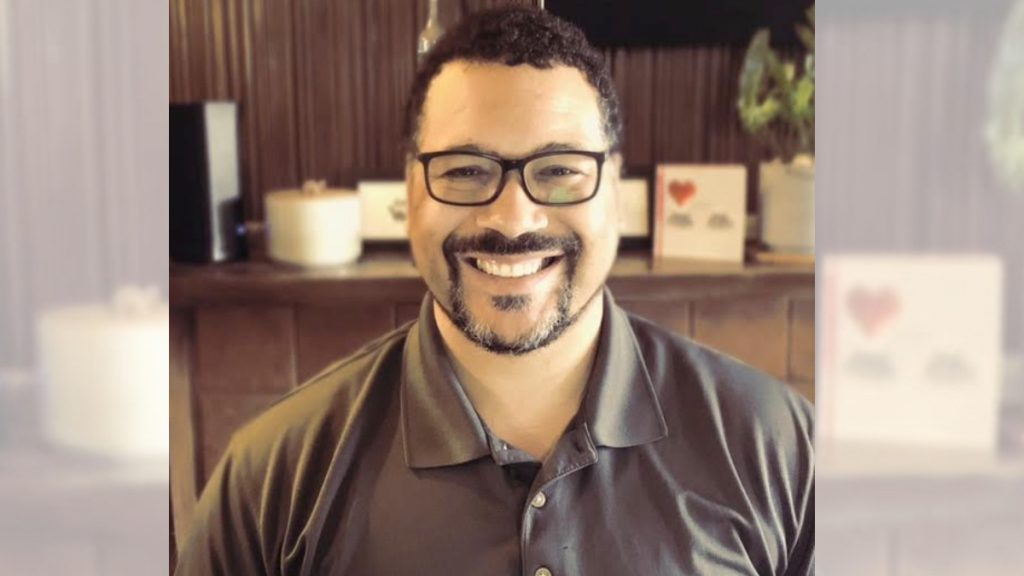By Michael Niehoff
Education Content Coordinator, iLEAD Schools
Distance learning during the pandemic certainly created many challenges. Some learners, facilitators, parents and others pined to return to in-person school. However, facilitator Ian Miller was not one of them.
Ian Miller, a veteran social science educator who has worked in a variety of school environments, is now an online educator to stay. Miller, who joined iLEAD Online in April 2021, realized that online learning was his new jam.
“I embraced the challenge,” Miller said. “I fell in love with all the new ways to learn and collaborate.”
Although new to iLEAD, Miller has 19 years of experience teaching government, history and macroeconomics in private parochial schools, inner city charter schools, art-centered schools and public high schools.
Miller is now facilitating iLEAD Online’s AP Macroeconomics and AP Seminar, the first part of the online school’s AP Capstone Course.
Embracing Online Learning, Emerging Technologies
Miller was attracted to iLEAD Online for many reasons.
Describing himself as more bullish on technology tools compared to many of his peers, Miller began to see these emerging technologies as a path for greater learner success.
“I was developing such a new and exciting skill set and wanted to pursue this further,” Miller said. “I saw new ways to not only instruct and assess but also for learners to engage and take ownership.”
Like many of his learners, Miller saw more advantages of online learning, including flexibility, creativity and personalization.
“It’s amazing how much more focused, relaxed and productive we can be when not facing long commutes,” Miller added.
History Is Changing
Miller is excited about where social science courses are heading. “Learners are much more interested in what’s happening now and where we’re going,” Miller said.
“The challenge is not to just examine the history but also how to make it relevant and applicable.” Miller points to government courses in which learners focus on taking action. He said young people are becoming activists and that part of his role is to help them develop historical foundations and requisite skills to do high-quality work.
“History can help us understand actions, advocacy and challenges and how our predecessors navigated them,” he said.
As an example, Miller connects the work of labor leader Cesar Chavez with the work of environmental activist Greta Thunberg. He ties the civil rights movement of the 1950s and ’60s to Black Lives Matter activism. “As learners study the history of successful social change, they learn that real change is complex,” Miller said. “They learn that it’s about creating alliances, allies, common voices and unified messages.”
learner Voices, Civil Discourse
Miller sees all this as part of a shift happening in teaching and learning. For facilitators, he said it’s less about the knowledge base and more about their being able to moderate difficult conversations and sensitive material.
“It’s about guiding learners to a safe space,” Miller said.
Miller sees his role as helping young people learn to have educated and respectful conversations — civil discourse. Miller suggests that this is almost a lost art in our culture and desperately needed as well.
“These discourse skills are a form of literacy, and these opportunities are the penultimate critical-thinking experiences,” he said. “We have to help another generation get good at this again. Our pundits and talking heads have lost this.”
AP Is Changing Too
Miller appreciates that teaching and learning are becoming more project and inquiry-based, and he sees changes in AP courses reflecting this. He cites the AP Capstone Seminar Course as a good example.
“Teams of learners are engaging in new ways of co-learning,” Miller said. “This course is built well for project-based learning. It requires facilitators to do lots of coaching, guiding, questioning and pushing learners to go deeper.”
Miller said aspects of PBL, such as Presentations of Learning, align well with the direction AP is taking as well.
“All facilitators need to embrace the idea of getting their learners to be able to articulate and present their learning publicly, academically and professionally,” Miller said.
Engaged, Excited
iLEAD Online Director Erin Jones is pleased to have Miller in the learning community. “We are excited to have him join our team, bringing experience in teaching AP classes and his excellence in individualized support, going above and beyond for learners,” Jones said.
Miller hopes to continue to push his learners to expand their views of history and the world, while embracing new and diverse voices, stories and journeys.
“I want them to not only learn the issues but also be part of creating powerful online communities,” he said. “I want to help facilitate opportunities in which learners as well as their communities can benefit.”
With his focus on historical connections and civil discourse, his learners and their communities are sure to benefit. “We make connections and then we find common ground,” Miller said.

